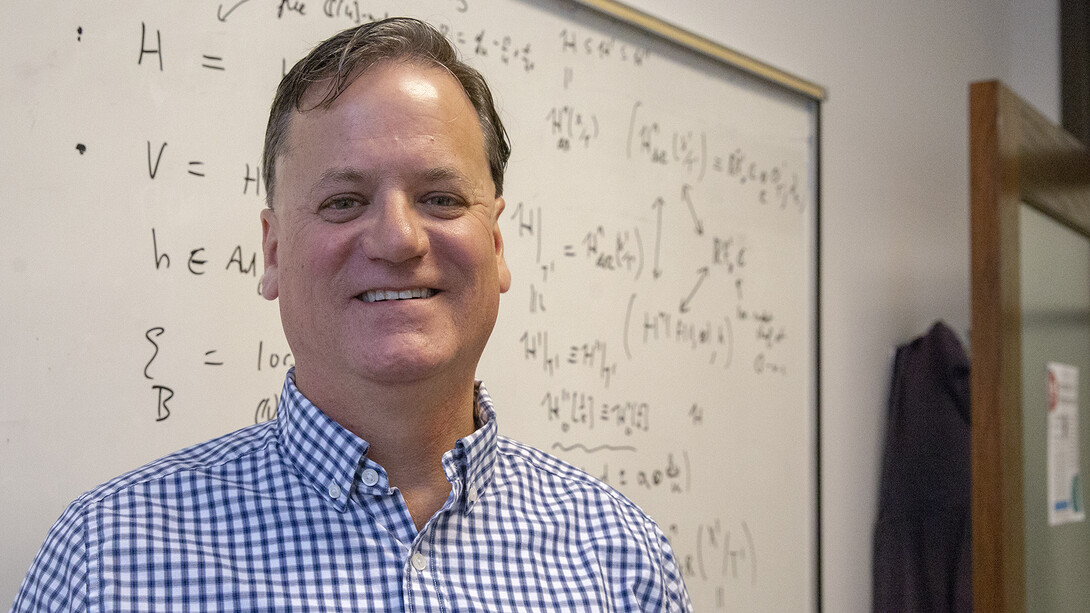
Lightbulb moments, those rare flashes of brilliance that power personal and professional breakthroughs, are often linked to the mundane.
Sir Isaac Newton was out for a stroll when the gravity of his apple moment hit home. Constantin Fahlberg forgot to wash his hands and discovered saccharin. Sir Paul McCartney woke up with the melody of “Yesterday” playing in his head.
For Nebraska’s Mark Walker, inspiration that helped prove a longstanding and complex mathematical conjecture came while enjoying a beer and watching Thursday Night Football. The discovery — amplified by a career dedicated to mathematics education and research — recently led the University of Nebraska–Lincoln’s Willa Cather Professor of Mathematics to being named a fellow of the American Mathematical Society.
“I’ve had this sort of epiphany before but, upon review, I always found a silly mistake or that I vastly oversimplified the problem,” Walker said. “This was an exception and it remains the weirdest math experience I’ve ever had.”
Pathway to abstract math
Through his K-12 years, math clicked for Walker. It was consistently his best subject and, as the difficulty level increased, his fascination for numbers grew.
“But, through high school, I was not really interested in math as a major area of study,” Walker said. “Then, during my freshman or sophomore year in college, I realized the only thing I was super interested in was math.”
Walker’s pathway to becoming an internationally-recognized leader of research into algebraic K-theory — an intricate branch of mathematics that exists at the nexus of geometry, topology, ring theory and number theory — started with a proofs-based course. The class, led by Edward Gaughan at New Mexico State University, was the first time Walker used axioms (accepted truths in mathematics) to develop proofs for theorems.
“The concept of being able to establish something based on axioms that is true beyond a shadow of a doubt resonated in me,” Walker said. “The work has an excitement of discovery, a sense of exhilaration, when you realize you’ve completed something that no one has ever done in the history of the world.”
Football proof
While not completely disconnected to a high school algebra course, research into algebraic K-theory pushes the boundaries of mathematics. It adopts a sophisticated and much more abstract approach to establishing mathematical proofs — pathways that are difficult (nearly impossible) to explain in layperson’s terms.
“The areas of research I pursue are most accessible to maybe 50 to 100 people worldwide,” Walker said. “But, generally speaking, I’m a person who works to prove whether precise math statements are true or false.”
Walker’s Thursday Night Football proof centered on the Buschbaum-Eisenbud-Horrocks conjecture. A somewhat famous conjecture within the field that was posed nearly 40 years ago, the problem aims to predict total Betti numbers within modules of finite projective dimension.
He took a run at the conjecture using a technique he used in other projects. The idea to use a relatively simple, understood approach grew from a conversation with a graduate student who was working on a separate conjecture.
“I realized if it had the possibility to work in one context, then it could also work in this more famous context,” Walker said. “Within about an hour, I realized that it worked. It was a shock because proofs usually take months to complete.”
Apprehensive about the ease of the proof, Walker presented the idea to Luchezar Avramov, a department colleague and Dale M. Jensen Chair in Mathematics. Avramov, who had also worked on the same conjecture, worked through the problem and confirmed that Walker’s proof held water.
The concept was reviewed and accepted by additional peers within the mathematics field and published in the Annals of Mathematics (Second Series, Vol. 186, No. 2) in September 2017.
“While we were excited about the proof, it was definitely a happy/sad moment,” Walker said. “Building on ideas of the proof, we were able to disprove a whole array of other conjectures. One of those included the problem the graduate student — the one I suggested should use the same technique — was working on.”
AMS honor
Walker is one of 52 mathematical scientists to be named fellows in the American Mathematical Society’s Class of 2020. He is the 10th University of Nebraska–Lincoln faculty member selected since the award launched in 2012.
“It’s very flattering and I feel very honored to be named a fellow,” Walker said. “It’s certainly an honor that includes some very impressive people.”
The honor is reserved for society members who have made outstanding contributions to the creation, exposition, advancement communication and utilization of mathematics. Fellows present a public face of excellence in mathematics, advise the society’s president and council on public matters, and help elect new fellows.
Walker joined the Nebraska faculty in 1996. He has received the College of Arts and Sciences Distinguished Teaching Award and worked to improve the Department of Mathematics’ graduate program as its graduate recruiting chair.
“I love working in this department,” Walker said. “It’s full of some really great people who are often selfless in their activities. Our combined dedication to teaching students and conducting research is what makes this department excel and, often, leads us to individual awards like this AMS fellowship.”
Nebraska faculty who earned the honor while working on campus are Luchezar Avramov, Susan Hermiller, Srikanth Iyengar, Jim Lewis, David Manderscheid, John Meakin, Judy Walker, Mark Walker, Roger Wiegand and Sylvia Wiegand. Iyengar and Manderscheid are listed at their current institutions, University of Utah and Ohio State University, respectively. Roger and Sylvia Wiegand received the honor as emeriti professors.







